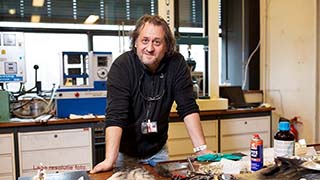Rubber for Eternity

In 2016, prof. dr. Francesco Picchioni, Chemical Technology, University of Groningen, filed a patent application based on his research 'Recycling of Rubber'. A real gap in the market: ‘Recycling rubber is a social problem. The surplus of used rubber is now burned and that is bad for the environment. Our invention gives new applications to rubber from discarded car tires.’
About 7 million car tyres are discarded in the Netherlands each year. The total weight of these tyres is over 110,000 tons. Recently, a rule has been applied that 20% of these end-of-life tyres must be re-used. Picchioni: ‘We have developed a patented application in the lab that makes new and elastic base material out of recycled rubber tyres that is suitable for re-use and new applications. The new base material is durable and suitable for large industrial use at a competitive price.’
The proof-of-principle works!
Picchioni's research into the revaluation of rubber stems from the observation, after a literature search, that worldwide it is all too easily assumed that rubber is not recyclable. This is a matter of honour for the Groningen-based researcher and his team: ‘An incomprehensible point of view, of course, in a time of a circular society and advancing science.’ Time for action. The Groningen team located at Nijenborgh 4 at Zernike Campus, spent months in the lab to develop a proof-of-principle that enables the revaluation of rubber. A proof-of-principle is a test or experiment aimed to determine whether the technology or principle you have devised actually functions and is feasible. A moment of euphoria, which the Groningen researcher vividly recalls in his office two years later: ‘A student knocked on the door here and shouted: '’Francesco, the PoP works!’’ And then you suddenly realise that as a researcher you may have a commercial product on your hands and knowledge that you need to protect!’
Screening & Scouting
For the feasibility study into the filing of a possible patent, Picchioni approached the IP & Business Development team, part of Northern Knowledge, at Kadijk, Zernike Campus. Picchioni: ‘An important step to avoid wasting any energy, because not all knowledge is patentable. For example, an invention must meet the criteria of inventiveness, and knowledge about the invention may not have been publicly disclosed anywhere in the world prior to the date of filing the patent application.’ After a few weeks, Picchioni received the green light that his knowledge from the lab was indeed appeared to be novel and the process of obtaining a patent application was to be started for the invention of revaluing rubber. Knowledge valorisation leading to surprising new applications. To reduce health costs, for instance: ‘One of my students wants to reduce the consequences of falling off a bike by applying an elastic rubber patch on the sleeve of a jacket, whereby the rubber patch softens any contact with the ground after a fall.’ A creative application for which the re-use of rubber car tyres is perfectly suited: ‘And fewer fractures after falling off a bike also means lower healthcare costs. Knowledge protection pays off on all levels,’ says the Groningen researcher, revealing his social drive.
Patenting and publishing reinforcing each other
Knowledge valorisation by patenting is now in his genes. Besides a request for a patent into 'Revaluing Rubber', a patent application was also filed for Francesco Picchioni's research into carbohydrate-based linear polyesters. The innovative method provides new applications including water-based glue. A stepping stone to new challenges in Green Chemistry that will eventually lead to new research, patents and publications as well. A golden route to valorisation that only has winners says Francesco: ‘Before filing a patent application, you have to be patient as a researcher with publishing, because it has to be investigated whether an invention is also an invention according to the (international) patent law.’ But patience pays off here, concludes the flamboyant Italian born Groningen-based professor: ‘For the researcher: protecting knowledge on an invention gives you the recognition that you have invented something new. And publishing on this knowledge strengthens your reputation as a scientist. For the university: it strengthens the university's reputation in its value as a socially relevant knowledge institute. Everybody happy!’
IP-Méé with University of Groningen and UMCG! Contact us for support: ip-info@rug.nl
| Last modified: | 20 March 2025 10.48 a.m. |
